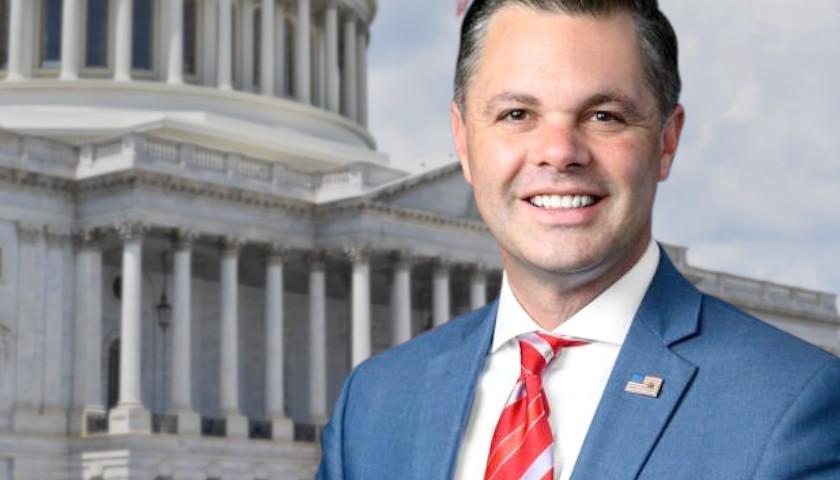Amid rising concerns about the liberal political agenda driving environmental, social, and governance (ESG) investment decisions at the expense of retirement income, U.S. Representative Zach Nunn (R-IA-03) has introduced the “Protecting Retirees’ Savings Act.”
The bill, according to proponents, will help eliminate conflicts of interest for financial managers that cost investors by lowering investment returns.
“Saving for retirement has gotten harder for Iowans due to rising costs and inflation, which is why it’s more important than ever to do everything in our power to maximize Iowans’ retirement savings,” Nunn said in a press release. “There’s no reason investment managers should be making decisions based on anything other than maximizing returns, and that’s exactly what this bill will help ensure.”
So-called ESG investment practices penalize companies for their policies or political views if they don’t comport with woke ideas of “social good.” Matthew Lai writes, “According to the doctrine of corporate social responsibility, businesses are supposed to pursue social good instead of concerning themselves ‘merely’ with profit.
And leading this charge to put “social good” over profit is a globalist duopoly, Glass Lewis and Institutional Shareholder Services (ISS). These foreign-owned consulting firms make up an estimated 97 percent of the proxy advisory market.
The two firms can influence as much as 30 percent of shareholder voters, according to a 2018 report by the Harvard Law School Forum on Corporate Governance. And the American Council for Capital Formation reported that 175 asset managers, with control of more than $5 trillion in assets, voted with ISS more than 95 percent of the time.
As the Wall Street Journal Editorial Board recently noted, both firms supported a shareholder resolution this year by New York City’s pension funds requesting an audit of Starbucks’s labor practices. It passed with 52 percent support. Last year they lent critical support to a resolution for an independent racial equity audit at McDonald’s, which carried with 55 percent.”
Glass Lewis asserted, “We may recommend voting against responsible directors” where it finds climate disclosures “to be absent or significantly lacking.” WSJ’s editorial board asks, What qualifies as “significantly lacking”?
ISS said it will “generally vote against” directors “in cases where ISS determines that the company is not taking the minimum steps needed to understand, assess, and mitigate risks related to climate change to the company and the larger economy.”
Such woke drivers are costing investors money, diminishing returns, Nunn said. The decisions are impacting 401(k)s, college savings 529 plans, state retirement plans.
The Biden administration has injected itself into the controversy, pushing a rule allowing fiduciaries to weigh climate change and other social and governance issues when selecting retirement investments for clients. Doing so, critics say, is a breach of the obligation the financial planners have to work in the best interest of their clients. More than two-dozen state attorneys general have sued the administration over the rule.
“The reality is right now you can have a farmer in Iowa whose retirement plan is being invested in Chinese batteries that are in direct competition to his very livelihood,” the congressman told The Iowa Star on a recent Simon Conway Show on NewsRadio 1040 WHO in Des Moines. “You could have a teacher right here in Iowa whose retirement plan is being used to fund a type of education that not only do they not agree with but is completely against the very type of education they are teaching in their classrooms and trying to instill in the next generation of young leaders.”
Some investors have gotten out. Reuters reported equity funds with an ESG tilt suffered a large loss of investors in the three months to end-June, dragging the sector into a rare net outflow for a first half of the year.
Nunn is a member of the House Financial Services Committee, which recently held hearings to shine a light on the costly practice of proxy resolutions from progressive investors.
The congressman’s bill aims to:
- Require the Securities and Exchange Commission (SEC) to issue final rules prohibiting the use of robovoting with respect to votes related to proxy or consent solicitation
- Prohibit institutional investors from outsourcing voting decisions with respect to votes related to proxy
- Remove requirements to vote, so no one would be required to cast votes related to proxy
“We need to hold these top money managers accountable,” Nunn said. “Far too often they are basically doing robo-voting. They’re simply taking the direction from these two companies on every investment being made, resulting in a large amount of people’s individual dollars being used for a political agenda versus actually being invested in the things that are going to return money for them when they retire.”
– – –
M.D. Kittle is the National Political Editor for The Star News Network.





